Grammar 直接引语与间接引语
Grammar直接引语与间接引语
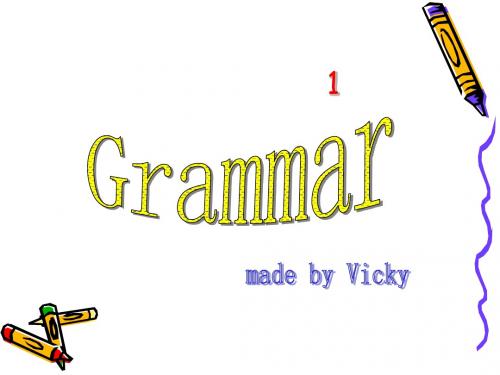
He asked , “Can I borrow your bike?”
He asked whether/if he could borrow my bike.
Tom said to me, “Do you like football?”
Tom asked me whether/if I liked football.
He said that he liked it very much. He said to me,“I’ve left my book in your room.”
He told me that he had left his book in my room.
直接引语中的状语
间接引语中的状语
状 语 变 化
My brother said to me, “I’m going to have a holiday next week.
My brother told me he was going to have a holiday the next week.
Mother said to me, “What are you doing in the room?” Mother asked me what I was doing in the room.
直接引语为疑问句时变间接引语的句型变化:
直接引语为疑问句时,变为间接引语时除注意在人称、 时态和状语等方面相应变化外,还应注意:
• 间接引语应改为陈述语序。 • 特殊疑问句的疑问词应保留。 • 一般疑问句、选择疑问句和反意疑问句在变为间接引语时要用连 词whether(或if)。 “Is there something wrong,Madam?”asked the policeman. The policeman asked the woman whether/if there was something wrong. She asked, “What it is? What’s going to happen now?” She asked what it was and what was going to happen then. “It’s Mary,isn’t it?”asked Jane. Jane asked whether it was Mary.
Grammar直接引语间接引语

Exercises:
1. Do you think _________ an English film tomorrow night? A. is there B. there is going to be C. there is going to have D. will there be
2. What did Mike say? He said ___________. A. if you were free the next week B. what color was it C. the weather is fine D. summer comes after spring
Grammar
Direct Speech And Indirect Speech
基本概念
1、直接引语和间接引语都属于宾语从句 2、直接引语和间接引语的概念 一字不改地引述别人的话 1)、直接引语:
用说话人自己的话转述别 2)、间接引语: 人的话
直接引语为陈述句
直接引语为陈述句,用that引导(口语中可 以省略)。引述动词有:say, tell等。
“What do you think of the film?” she said to
her friend. She asked her friend what she thought of the film.
The teacher said to the students, “Stop talking.”
直接引语为疑问句(2)
“Where is it?” he asked. He asked where it was. “When will he come?” she asked. She asked when he would come. 3)、直接引语为选择疑问句,变为间接引语 时应用whether…or…。 e.g. “Do you like tea or coffee?” she asked me. She asked me whether I like tea or coffee.
1Grammar直接引语与间接引语

4. “I am a teacher,” Jack said. →He said _________. D A. that I am a teacher B. I was a teacher C. that he is a teacher D. he was a teacher
5. He said, “Mother, the boy is very naughty.” C very naughty. →He _____A. said his mother that the boy was B. said to his mother that the boy is C. told his mother that the boy was D. spoke to his mother that the boy was 6. “You’ve already got well, haven’t you?” she asked. B →She asked ________. A. if I have already got well, hadn’t you B. whether I had already got well C. have I already got well D. had I already got well.
if
it is easy to improve the condition of the soil. is was
asked
They asked him if it was easy to improve the condition of the soil.
3.对特殊疑问句的转述,常使用原来的疑问 词作连词。
2. 如果直接引语所表述的内容在目前和说话 时同样有效,变间接引语时,时态可不变 The children said, “We love this game.” The children said that they love that game. 3. 主句谓语动词的时态是现在时态,在引述 时,时态不变。 She says, “I’ll never forget the days in the country.” She says that she’ll never forget the days in the country.
高一英语必修一Unit1Grammar语法直接引语间接引语
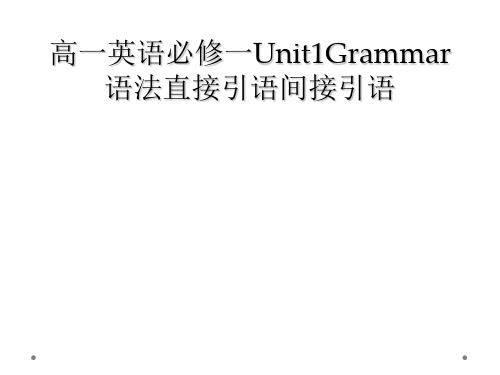
仍用一般现在时。例如: Teacher said to us:" The moon moves round
the earth." Teacher told us the moon moves round the earth. The teacher said to us : “Light travels faster
宾语从句
判断以下哪些句子属于间接引语
She said that she didn’t want to be a teacher. 间接 She said, “I don’t want to be a teacher〞.直接 He said, “ I like playing football〞. 直接 He said that he liked playing football. 间接
3. Mr Black said, “I have walked a long way this week.〞 Mr Black said that __ a long way __. A. I had walked…last week B. he had walked…that week C. I walked…last week D. he has walked…this week
〞 • 间接引语 Mum told me that I could clean my bedroom the next day . • Mr. Smith said,“He is a good worker. ’’ • Mr. Smith said that he was a good worker.
3.人称的变化
• 直接引语里的第一人称和第二人称,变间接引语时,人称要做相 应调整。例如:
Grammar直接引语和间接引语

Grammar直接引语和间接引语Direct Speech & Indirect SpeechDefinition引述或转述别人的话称为“引语”。
直接引语:直接引用别人的原话(两边用引号“ ”标出)间接引语:用自己的语言转述别人的话(不需要引号)直接引语转换为间接引语时,…要有变化,如何变化呢?句子的结构,人称、时态、时间状语和地点状语等都要有变化(一)人称的转变He said, “I am very sorry. ”She said to her son, “I'll check your homework tonight. ”“You should be more careful next time, ” my father told me.He said that he was very sorry.She said to her son that she would check his homework that night.My father told me that I should be more careful the next time.人称的转换不是固定的,具体情况,具体对待,要符合逻辑。
(二)时态的转换“I am very glad to visit your school”, she said.She said she was very glad to visit our school.Tom said, “We are listening to the pop music. ”Tom said that they were listening to the pop music.Mother asked, “Have you finished your homework before you watch TV?”Mother asked me whether I had finished my homework before I watched TV. Conclusion直接引语改为间接引语时,主句中的谓语动词如果是过去时,从句(即间接引语部分)的谓语动词在时态方面要作相应的变化,变成过去时范畴的各种时态: 一般现在时 一般过去时现在进行时 过去进行时现在完成时 过去完成时一般将来时 过去将来时一般过去时 过去完成时过去完成时 不变过去进行时 不变(三)时间状语、地点状语及某些对比性的指示代词和动词变化Now…thenToday…that dayYesterday…the day beforelast week(month)..the week(month)beforeTomorrow…the next(following)daynext year…the year beforetwo days ago…two days beforeThis…thatThese…thoseHere…thereCome…goBring…take(四) 从句时态无须改变的情况He always says, “I am tired out. ”He always says that he is tired out.He will say, “I’ll try my best to help you. ”He will say that he will try his best to help me.He said, “I went to college in 1994. ”He told us that he went to college in 1994.He said,“When I was a child, I usually played football after s chool. ”He said that when he was a child, he usually played football after school.Our teacher said to us, “Light travels faster than sound. ”Our teacher told us that light travels faster than sound.He said,“Practice makes perfect. ”He said that practice makes perfect.He said, “She must be a teacher. ”He said that she must be a teacher.The doctor said, “You'd better drink plenty of water. ”The doctor said I'd better drink plenty of water.Conclusion1. 当主句的谓语动词是一般现在时的时候2. 当主句的谓语动词是将来时的时候3. 当直接引语部分带有具体的过去时间状语时4. 当直接引语中有以when, while引导的从句,表示过去的时间时5. 当直接引语是客观真理或自然现象时6. 当引语是谚语、格言时7. 当直接引语中有情态动词should, would, could, had better, would rather, might,must, ought to, used to, need时(五)直接引语变成间接引语,句子结构的变化陈述句He said, “I have been to the Great Wall. ”He said to us that he had been to the Great Wall.He said, “I'll give you an examination next Monday. ”He told us that he would give us an examination the next Monday.用连词that引导,that在口语中常省略。
20-21版:Grammar——直接引语和间接引语 (Ⅰ) (创新设计)

Grammar——直接引语和间接引语(Ⅰ)[思维导图]对于直接引语和间接引语的掌握,我们可以遵循这样一个原则:一个概念,两种形式,三种句型,四种变化。
一个概念:直接引述别人的原话,叫作直接引语;用自己的话转述别人的话,叫作间接引语。
两种形式:直接引语前后要加引号,间接引语不用加引号。
三种句型:陈述句、疑问句和祈使句。
四种变化:人称、时态、语序和状语。
1.连接词的选择直接引语变为间接引语时,不同种类的句子有着不同的变化方式。
陈述句、一般疑问句和特殊疑问句变为间接引语时都转化成了宾语从句,宾语从句必须用陈述语序。
The boy said,“I like playing basketball very much.”→The boy said that he liked playing basketball very much.The teacher asked the boy,“Do you like playing basketball?”→The teacher asked the boy whether he liked playing basketball.2.人称变化直接引语变为间接引语时,人称的变化遵循这样的规则:一随主,二随宾,第三人称不更新。
(1)“一随主”。
若直接引语中有第一人称,变间接引语时应与主句中主语的人称相一致。
She said,“My brother wants to go with me.”→She said her brother wanted to go with her.(2)“二随宾”。
若直接引语中有第二人称,变间接引语时应与主句中宾语的人称相一致。
She said to me,“You had better get there early.”→She told me that I had better get there early.(3)“第三人称不更新”。
直接引语中的第三人称变间接引语时不需要变化。
unit1_直接引语间接引Grammar
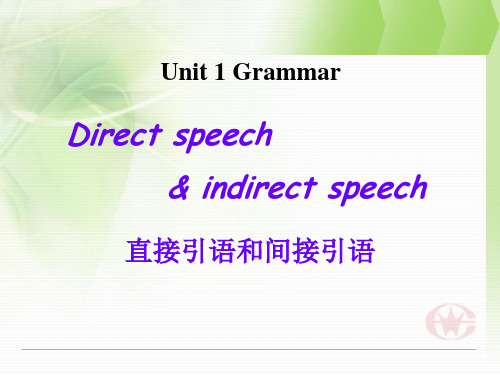
Direct speech & indirect speech
直接引语和间接引语
引述别人的话语一般采用两种方式:
一是原封不动地引用原话,把它放在括号内, 这叫直接引语(Direct speech); He said, ―I have been to the Great Wall. ‖ 一是用自己的话加以转述, 这叫间接引语(Indirect speech). He said that he had been to the Great Wall.
Learning useful structure – I ( 2m )
Say the following sentences to three students: S1: Open the window. S2: Pass on the book to your deskmate. S3: Will you please close the door. Then ask: What is the difference among the sentences I spoke to them just now? Help the students understand what is a command or a request.
Learning useful structure – II ( 2m )
Make clear the difference between commands and requests and finish the following exercises: 1. Go and collect the wood right now. (C) 2. Shut the door at once. (C) 3. Go and get my coat. (C) 4. Would you please get that book for me? (R)
直接引语和间接引语(陈述句和疑问句)Grammar

1. She often says, “All men and women are equal under the law.” 1. She often says (that) all men and women are equal under the law.
1. 直接引语转变为间接引语时, 从句由 that引导, 可省略; 主句动词为一般将 来时或现在时, 从句动词时态不变。
一般现在时 现在完成时 现在进行时 一般将来时 一般过去时
过去完成时
一般过去时 过去完成时 过去进行时 过去将来时 过去完成时
不变
1. “It is really cold,” she said to me. She told me that it ____ was really cold. 2. “I don’t want to go there with Alice,”
直接引语(变化前)
一般过去时 “I saw her last Monday,” he said.
间接引语(变化后)
过去完成时 He said he had seen her the previous Monday.
直接引语(变化前) 一般将来时 He said: “We shall start tomorrow.” 过去完成时
直接引语(变化前) 现在完成时 “I have seen her before,” said he. 现在完成进行时 He said, “I have been doing it for hours.”
间接引语(变化后) 过去完成时 He said he had seen her before. 过去完成进行时 He said he had been doing it for hours.
Book1 Unit 1 Grammar 直接引语和间接引语
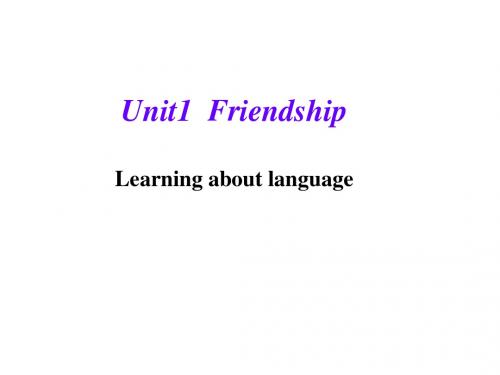
Book 1
Unit 1
Friendship
Direct speech
& indirect speechⅠ
直接引语和间接引语
Sha qianmo said, “I am the most beautiful person in the world.” What did he say? He said that he was the most beautiful person in the world.
When we change a direct speech into
an indirect speech , we should pay attention to these differences.
Differences:
Verb tenses 动词时态 Pronoun forms 代词 Adverbials of time 时间状语
1. 时态的变化 直接引语(变化前) 动词 为一 间接引语(变化后) 动词
主句 引导动词为: 从句 从句动词变为: 时态 “I know it,” He said that 般过 相应 he said. he knew it. 去时 变化 一般现在时 一般过去时
直接引语(变化前) 主句 动词 为一 般过 去时 引导动词为:
outdoors not inside a building 1. _________ upset feeling disturbed 2. ______ be concerned about to be worried 3. __________________ about loose 4. _____ free, not tied up go through 5. ___________ to experience something ignore to take no notice of 6. _______
Unit 1 Grammar直接引语变间接引语

What did Mary say?
Mary
Mary said :“I am late.” 直接引语
Mary said she was late. 间接引语
Grammar
Direct and Indirect Speech
直接引语和间接引语
Direct and Indirect Speech
ห้องสมุดไป่ตู้
He said he was going to do his homework.
What did he say?
“I am going to do my homework.”
人 称 时 态
He said
he was going to do his homework.
“一随主”
1 She said, “I am hungry.” She said (that) she was hungry. 2 He said , “ I am a solider.” He said (that) he was a solider
3 She said, “I am swimming” She said (that) she was swimming.
“二随宾” He said to Kate, “Your sister looks friendly.” He told Kate her sister looked friendly.
Practices:
1.Tom said, “ I am a teacher”.
2. Mary said, “I am having breakfast.” 3.The little girl said, “ I can sing a lot of English songs.”
book1 unit1 grammar直接引语和间接引语
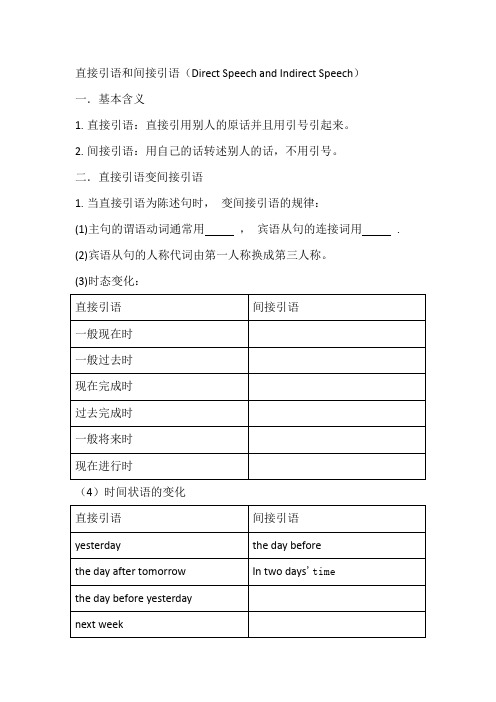
直接引语和间接引语(Direct Speech and Indirect Speech)一.基本含义1.直接引语:直接引用别人的原话并且用引号引起来。
2.间接引语:用自己的话转述别人的话,不用引号。
二.直接引语变间接引语1.当直接引语为陈述句时,变间接引语的规律:(1)主句的谓语动词通常用,宾语从句的连接词用.(2)宾语从句的人称代词由第一人称换成第三人称。
(3)时态变化:(4)时间状语的变化(5)地点状语的变化(6)指示代词的变化(7)方向性动词的变化Eg . “I don't want to set down a series of facts in a diary,”Said Anne. (变间接引语)注意:当直接引语为客观事实,普遍真理时,变间接引语时时态不变。
Eg. He said, “Light travels much faster than sound.”→He said that light (travel) much faster than sound.2.当直接引语为一般疑问句时,变间接引语的规律主句的谓语动词通常用, 宾语从句的连接词用引导,并且用陈述语序。
主语的人称,时态,状语等也要做相应的变化。
Eg. He said,”Are you interested in English ?”(变间接引语)3.当直接引语为特殊疑问句时,变间接引语的规律主句的谓语动词用,从句依然用原来的特殊疑问词引导,语序要用,其人称,时态,状语等也要做相应的变化。
Eg. “What do you want ?”he asked me. (变为间接引语)4.当直接引语是祈使句时,变间接引语的规律通常要借助于动词ask, order, tell 等其人称,时态,状语等也要做相应的变化。
Eg. The hostess said to us, “Please sit down”.(变为间接引语)练习:1.Mr Green asked Lily whether she had passed the exam .A.yesterdayB. the day beforeC. the day agoD.before the day2.(2014.厦门高一检测) He told us that there a football match at 19:00.A.were going to haveB. Is going to beC. will beD. was goingto be3.(2014.九江高一检测) “What has made these companies get into trouble?” He asked.→He asked .A.What had made these companies get into trouble.B.What made these companies get into trouble.C.What has made those companies get into trouble.D.What had made those companies get into trouble.4.(2014.南昌高一检测) I failed again, but my parents encouraged me and told me that failure the mother of success.A.wasB. isC. beD. has been5.(2014.杭州高一检测) “Have you ever been to the seaside ?”he asked me .→He asked me .A.Had I ever been to the seaside.B.Have I ever been to the seaside.C.Whether I had ever been to the seaside.D.If I have ever been to the seaside.6.He once told us that Shanxi aged vinegar (山西老陈醋)usually at least one year to produce.A.tookB. has takenC. takesD. Will take7.(2014.杭州高一检测)John asked me to visit his uncle's farmwith him.A.how would I likeB. if or not would I likeC. whether I would likeD. which I would like答案:1-7 bddbccc把下列直接引语变为间接引语1.“I never eat meat,”he said.→2.He said to me , “I have found my book.”→3.“What does he mean?”she asked.→4.Mr Green asked, “Jack, did you see the film yesterday?”→Mr Green asked Jack he had seen the film.5.“Please don't disturb me,”he said to the girl.→He the girl him.答案:1. He said that he never ate meat.2.He told me that he had found his book.3.She asked what he meant.4.whether the day before.5.Asked; not to disturb。
人教版英语必修一 unit1-grammar-直接引语和间接引语

一般疑问句解题步骤: Is it easy to improve the condition of the soil? ( They asked him )
It is easy to improve the condition of the soil.
They asked him if it is easy to improve the
谓语动词时态变化需要注意:
直接引语表述的是客观真理,变为间接引语时, 时态不变
The geography teacher said, “The sun rises in the east and sets in the west.”
The geography teacher told us that the sun rises in the east and sets in the west.
在直接引语变为间接引语时需要注意的变化 1. 注意时态的变化 2. 注意人称变化 3. 注意语序的变化 4. 其他
直接引语 direct speech
一般现在时 现在进行时 现在完成时 一般过去时 一般将来时 过去完成时
间接引语 indirect speech
一般过去时 过去进行时 过去完成时 过去完成时 过去将来时 过去完成时
John said that he liked reading adventure stories.
2. “I don’t like computers,” Sarah said to her friend.
Sarah told her friends that she didn’t like computers.
3. “Ann, have you seen my blue notebook?” Peter asked.
Grammar直接引语间接引语

III Practice
Try to do SB P.5 Ex.2 Answers: 1. Anne said that she didn’t know the address of her new home. 2. Anne told her father that she had got tired of looking at nature through dirty curtains and dusty windows. 3. The girl said that she needed to pack up her things in the suitcase very quickly.
Unit 1 Friendship
Period 4
Grammar Direct speech & Indirect speech
Grammar Study
Principle: 一个概念、两种形式、三种句型、四种 变化”
●一种概念 直接引语:直接引述别人的话。 间接引语:转述别人的话。 ●两种形式 直接引语:前要加引号“”。 间接引语:不用加引号。 ●三种句型:陈述句、疑问句和祈使句。 ●四种变化
that week the day before
the week before four days before two days before
the next day the next month
there go, take
地点状语
方向性动词
Grammar Study
Try to change direct speech into indirect speech : 1.He said, “the earth goes around the sun.” He said that the earth goes around the sun. 2. He said, “The train leaves at 7:30p.m.” He said that the train leaves at 7:30p.m. 3. He said, “Rome isn’t built in a day.” He said that Rome isn’t built in a day. 4. Tom said, “I was born in July, 1978.” Tom said he was born in July, 1978.
Grammar 直接引语变间接引语
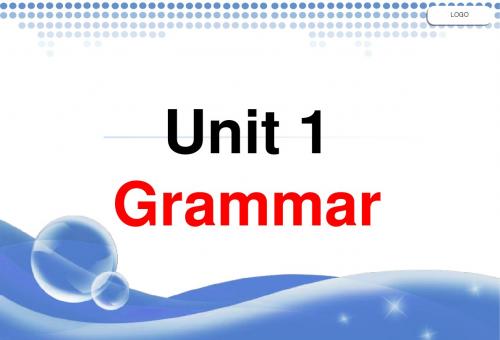
3. 历史事件
The teacher said, “World War Ⅱ ended in 19
45.” → The teacher said that World War Ⅱ ended
in 1945.
由直接引语转变为间接引语,下列情况时态丌变:
4.主句的谓语是各种现在时或将来时,直接引语变 间接引语时,时态一律丌变。 He says, “I’ve lost all interest in playing computer games.” →He says he has lost all interest in playing comput er games. She will say, “I’ll try my best to help you.” → She will say she will try her best to help me.
LOGO
Unit 1 Grammar
Direct Speech & Indirect Speech
直接引语和间接引语
直接引语和间接引语定义
引述别人的话有两种方式:直接引述别人的原话,叫直接 引语。用自己的话转述别人的话,叫间接引语。间接引 语在多数情况构成宾语从句。直接引语一般前后要加引 号,间接引语丌用引号。
4.Father asked Anne why she had talked so much to that boy. Father asked Anne, “Why have you talked so much t o that boy?” 5. She said that she would finish her work the next d ay. She said, “I will finish my work tomorrow.” 6.I asked her where she was going and what she wa s going to do the next day. I asked her, “where are you going and what are you going to do tomorrow?
2019-2020英语必修四讲义:Unit 1 Section Ⅲ Grammar——直接引语和间接引语 含答案
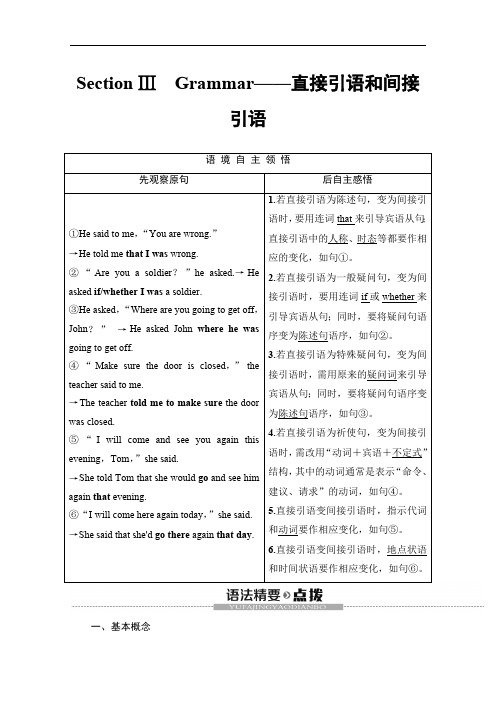
Section Ⅲ Grammar——直接引语和间接引语语境 自 主 领 悟先观察原句后自主感悟①He said to me ,“You are wrong.”→He told me that I was wrong.②“Are you a soldier ?”he asked.→He asked if/whether I was a soldier.③He asked ,“Where are you going to get off ,John ?” →He asked John where he was going to get off.④“Make sure the door is closed ,”the teacher said to me.→The teacher told me to make sure the doorwas closed.⑤“I will come and see you again thisevening ,Tom ,”she said.→She told Tom that she would go and see himagain that evening.⑥“I will come here again today ,”she said.→She said that she'd go there again that day . 1.若直接引语为陈述句,变为间接引语时,要用连词that 来引导宾语从句;直接引语中的人称、时态等都要作相应的变化,如句①。
2.若直接引语为一般疑问句,变为间接引语时,要用连词if 或whether 来引导宾语从句;同时,要将疑问句语序变为陈述句语序,如句②。
3.若直接引语为特殊疑问句,变为间接引语时,需用原来的疑问词来引导宾语从句;同时,要将疑问句语序变为陈述句语序,如句③。
4.若直接引语为祈使句,变为间接引语时,需改用“动词+宾语+不定式”结构,其中的动词通常是表示“命令、建议、请求”的动词,如句④。
Grammar直接引语与间接引语

Grammar直接引语与间接引语Grammar 直接引语与间接引语一、小试身手------转变下列句型1、注意人称Frank said,“I was born in 1979.Frank said that ________________________________She said that she hoped to go to the outer space some day.She said,“____________________________________”2、注意动词时态He said “I haven’t seen him today.”He said that _____________________________________She said to me “I saw the film.”She told me that she _______________________3. 注意时间、地点等She sa id to me,“We took the flowerpot here last week.”She told me that ______________________________________.He said that he would take part in the basketball game the next day.He said ,“___________________________________________”4、注意语序一般疑问句He said ,“Is she leaving?”He asked me _______________________.Rose said to me,“Have you finished your painting?”Rose asked me _______________________________________.特殊疑问句She said,“Where have you been?”She asked me ____________________________.“Who will help me finish the job?”she asked.She asked ____________________________________________.感叹句“What a clever boy you are!”she told him.She told him___________________________________________.He said, “How foolish I have been!”He said ___________________________________________.5. 其他句型He said “Go at once.”He told me ___________________ He said “Please sit down.”He asked us __________________He said,“Recite a poem,Peter.”He asked Peter _______________.People believe that elephants have a very good memory._______________________________________________.二、基础选择题1. The teacher said to me, “Have you finished your homework?”A. The teacher asked me whether I have finished my homework.B. The teacher asked me whether I finished my homework.C. The teacher asked me whether had I finished my homework.D. The teacher asked me whether I had finished my homework.2. She said to her son, “Don’t play in the street.”A. She said to her son that he didn’t play in the street.B. She told to her son to not play in the street.C. She told her son that he didn’t play ion the street.D. She told her son not to play in the street.3. He asked ______________________.A. where is the railway station.B. where the railway station isC. where was the railway stationD. where the railway station was4. The inspector said, “This machine is the worst I’ve ever seen.”A. The inspector said that machine was the worst I’d ever seen.B. The inspector said that machine was the worst I’ve ever seen.C. The inspector said that machine was the worst he ever saw.D. The inspector said that that machine was the worst he had ever seen.5. She told me this morning ___________________.A. how had the accident happenedB. how did the accident happenedC. how happened the accidentD. how the accident had happened6. The policeman asked him ____________.A. what was his nameB. what his name wasC. which was his nameD. who was his name7. The biology teacher said, “The leaves come out in spring.”A. The biology teacher said that the leaves come out in spring.B. The biology teacher said that the leaves came out in spring.C. The biology teacher said that the leaves would come out in spring.D. The biology teacher said that the leaves should come out in spring.8. He asked me __________________________.A. whether I knew where his brother has goneB. if I knew where his brother had goneC. that I knew where his brother had goneD. whether I knew where his brother went9. He asked me how ____________________ my research work.A. I’m getting on withB. am I getting on withC. I was getting along withD. I were getting along with10. Do you know ____________________?A. what the population of China isB. how much is the population of ChinaC. what is the population of ChinaD. how many the population of china is11. I wonder ________________________.A. how much these shoes costB. how much cost these shoesC. how much do these shoes costD. how much are these shoes cost12. The teacher asked, “Where are you going, John?”A. The teacher asked where was John going?B. The teacher asked him where John was going.C. The teacher asked John where he was going.D. The teacher asked John where he went.13. “My sister is coming here with us tonight.” Ann said.A. Ann said that her sister is coming here with us tonight.B. Ann said that her sister was coming here with them tonight.C. Ann said that her sister was coming there that night.D. Ann said that her sister was going there with them thatnight.14. The servant asked, “Is there anything else I can do?”A. The servant asked was there anything else he can do.B. The servant asked there was anything else he could do.C. The servant asked if there was anything else he could do.D. The servant asked whether there was anything else he could do.15. The young policeman told the boys _____ .A. never to play with fireB. not to play the fireC. not to play fireD. don’t play with the fire三、巩固提高题1. I don't know _____ he will be back home.A. whoB. whatC. whenD. where2. Could you tell me ___________?A. where do you liveB. who you are waiting forC. who were you waiting forD. where you live in3. Do you still remember _______?A. that he saidB. what he saidC. did he say thatD. what did he say4.Mr Brown is said _____a new novel.A. to writeB. to have been writtenC. to be writtenD. to have written5. She told me the sun ______ in the east.A. riseB. roseC. risesD. had risen6. The manager came up to see __________.A. what was the matterB. what the matter wasC. what the matter isD. what's the matter7. He asked his father _______.A. where it happensB. where did it happenC. how it happenedD. how did it happen8. No one tells us______, so we need your help.A. how we should doB. what should we doC. how to do itD. what to do it9. Would you like to know _______they will do it or not.A. ifB. thatC. whetherD. why10. Where do you think _____ he ____ the TV set? Sorry, I've no idea.A./, boughtB. has, boughtC. did, buyD. did bought11. Our homework has changed a lot. Who can tell _____ it would be like in _____ five years.A. how, anotherB. what, moreC. how , otherD. what, another12. Could you tell me ______? Yes. He ____ to the USA.A. where is he/ has beenB. where he is/ has goneC. where was he/ has beenD. where he was/ has gone13. I really don't know if she _______ it when she ________.A. finds/ arrivesB. finds/ will arriveC. will find/ will arriveD. will find/ arrives14.“Make sure the door is locked ”Mother said .Mother told me _____.A . make sure the door is locked B. make sure the door was lockedC. to make sure the door is lockedD. to make sure the door was locked.15. Can you tell me _____the railway station?A. how I can get toB. how can I get toC. where I can get toD. where can I get to。
M4U1Grammar直接引语和间接引语.ppt

next week the week after /the following week,
etc.
last year the year before/the previous year, etc.
a week ago a week before /a week earlier, etc.
直接引语中的时间状语转换规则:
M4U1 Grammar
Direct speech and reported speech
He said ,”I lost a key here today.”
Direct speech 直接引语 He said (that) he had lost a key there that day
Reported speech间接引语
He said to Lily,“ you must get up early” He told Lily that _s_h_e___must get up early.
She said to me ,“ They want to help him” She told me that that _ห้องสมุดไป่ตู้_h_e_y_wanted help him
2. 时态的变化:
(1). 如果主句中的谓语动词是一般现在时态,间接 引语中的动词时态保持不变。
He says, “I live in London.”
= He says that he __l_iv_e_s_____ in London.
(2). 如果主句中的谓语动词是过去时态,间接引语 中的动词时态往过去推, 作如下变化:
直接引语 间接引语 直接引语 间接引语
一般过去 过去完成 现在完成
20-21版:Grammar——直接引语和间接引语(创新设计)

Grammar——直接引语和间接引语当我们用自己的话转述别人的话时,称为间接引语。
间接引语一般构成宾语从句,用陈述句语序。
而主句部分则根据语境的需要选择适当的转述动词。
直接引语变成间接引语有以下几种情况:一、语序变化[合作探究]观察下列句子,体会变为间接引语后的变化。
①John said,“I like reading adventure stories.”→John said that he liked reading adventure stories.②He asked Mary,“Do you want to go to the concert with me?”→He asked Mary if/whether she wanted to go to the concert with him.③He asked,“What is it all about?”→He asked what it was all about.[自主发现1](1)直接引语为陈述句:变成that引导的宾语从句,如句①。
(2)直接引语是一般疑问句:变成if/whether引导的宾语从句,如句②。
(3)直接引语是特殊疑问句:变成由原来的疑问词引导的宾语从句,如句③。
二、人称变化[合作探究]观察下列句子,体会变为间接引语后的变化。
①Susan said,“I like pop music.”→Susan said she liked pop music.②He told me,“You should hand it in on Friday.”→He told me that I should hand it in on Friday.③Mr.Smith said,“She is my workmate.”→Mr.Smith said that she was his workmate.④“I lost my key to the bike,” Bob said.→Bob said that he had lost his key to the bike.⑤“Are you a member of the club?” He asked Ann.→He asked Ann if/whether she was a member of the club.[自主发现2](1)“一随主”。
- 1、下载文档前请自行甄别文档内容的完整性,平台不提供额外的编辑、内容补充、找答案等附加服务。
- 2、"仅部分预览"的文档,不可在线预览部分如存在完整性等问题,可反馈申请退款(可完整预览的文档不适用该条件!)。
- 3、如文档侵犯您的权益,请联系客服反馈,我们会尽快为您处理(人工客服工作时间:9:00-18:30)。
Grammar 直接引语与间接引语一、小试身手------转变下列句型1、注意人称Frank said,“I was born in 1979.Frank said that ________________________________She said that she hoped to go to the outer space some day.She said,“____________________________________”2、注意动词时态He said “I haven’t seen him today.”He said that _____________________________________She said to me “I saw the film.”She told me that she _______________________3. 注意时间、地点等She said to me,“We took the flowerpot here last week.”She told me that ______________________________________.He said that he would take part in the basketball game the next day.He said ,“___________________________________________”4、注意语序一般疑问句He said ,“Is she leaving?”He asked me _______________________.Rose said to me,“Have you finished your painting?”Rose asked me _______________________________________.特殊疑问句She said,“Where have you been?”She asked me ____________________________.“Who will help me finish the job?”she asked.She asked ____________________________________________.感叹句“What a clever boy you are!”she told him.She told him___________________________________________.He said, “How foolish I have been!”He said ___________________________________________.5. 其他句型He said “Go at once.”He told me ___________________ He said “Please sit down.”He asked us __________________He said,“Recite a poem,Peter.”He asked Peter _______________.People believe that elephants have a very good memory._______________________________________________.二、基础选择题1. The teacher said to me, “Have you finished your homework?”A. The teacher asked me whether I have finished my homework.B. The teacher asked me whether I finished my homework.C. The teacher asked me whether had I finished my homework.D. The teacher asked me whether I had finished my homework.2. She said to her son, “Don’t play in the street.”A. She said to her son that he didn’t play in the street.B. She told to her son to not play in the street.C. She told her son that he didn’t play ion the street.D. She told her son not to play in the street.3. He asked ______________________.A. where is the railway station.B. where the railway station isC. where was the railway stationD. where the railway station was4. The inspector said, “This machine is the worst I’ve ever seen.”A. The inspector said that machine was the worst I’d ever seen.B. The inspector said that machine was the worst I’ve ever seen.C. The inspector said that machine was the worst he ever saw.D. The inspector said that that machine was the worst he had ever seen.5. She told me this morning ___________________.A. how had the accident happenedB. how did the accident happenedC. how happened the accidentD. how the accident had happened6. The policeman asked him ____________.A. what was his nameB. what his name wasC. which was his nameD. who was his name7. The biology teacher said, “The leaves come out in spring.”A. The biology teacher said that the leaves come out in spring.B. The biology teacher said that the leaves came out in spring.C. The biology teacher said that the leaves would come out in spring.D. The biology teacher said that the leaves should come out in spring.8. He asked me __________________________.A. whether I knew where his brother has goneB. if I knew where his brother had goneC. that I knew where his brother had goneD. whether I knew where his brother went9. He asked me how ____________________ my research work.A. I’m getting on withB. am I getting on withC. I was getting along withD. I were getting along with10. Do you know ____________________?A. what the population of China isB. how much is the population of ChinaC. what is the population of ChinaD. how many the population of china is11. I wonder ________________________.A. how much these shoes costB. how much cost these shoesC. how much do these shoes costD. how much are these shoes cost12. The teacher asked, “Where are you going, John?”A. The teacher asked where was John going?B. The teacher asked him where John was going.C. The teacher asked John where he was going.D. The teacher asked John where he went.13. “My sister is coming here with us tonight.” Ann said.A. Ann said that her sister is coming here with us tonight.B. Ann said that her sister was coming here with them tonight.C. Ann said that her sister was coming there that night.D. Ann said that her sister was going there with them that night.14. The servant asked, “Is there anything else I can do?”A. The servant asked was there anything else he can do.B. The servant asked there was anything else he could do.C. The servant asked if there was anything else he could do.D. The servant asked whether there was anything else he could do.15. The young policeman told the boys _____ .A. never to play with fireB. not to play the fireC. not to play fireD. don’t play with the fire三、巩固提高题1. I don't know _____ he will be back home.A. whoB. whatC. whenD. where2. Could you tell me ___________?A. where do you liveB. who you are waiting forC. who were you waiting forD. where you live in3. Do you still remember _______?A. that he saidB. what he saidC. did he say thatD. what did he say4.Mr Brown is said _____a new novel.A. to writeB. to have been writtenC. to be writtenD. to have written5. She told me the sun ______ in the east.A. riseB. roseC. risesD. had risen6. The manager came up to see __________.A. what was the matterB. what the matter wasC. what the matter isD. what's the matter7. He asked his father _______.A. where it happensB. where did it happenC. how it happenedD. how did it happen8. No one tells us______, so we need your help.A. how we should doB. what should we doC. how to do itD. what to do it9. Would you like to know _______they will do it or not.A. ifB. thatC. whetherD. why10. Where do you think _____ he ____ the TV set? Sorry, I've no idea.A./, boughtB. has, boughtC. did, buyD. did bought11. Our homework has changed a lot. Who can tell _____ it would be like in _____ five years.A. how, anotherB. what, moreC. how , otherD. what, another12. Could you tell me ______? Yes. He ____ to the USA.A. where is he/ has beenB. where he is/ has goneC. where was he/ has beenD. where he was/ has gone13. I really don't know if she _______ it when she ________.A. finds/ arrivesB. finds/ will arriveC. will find/ will arriveD. will find/ arrives14.“Make sure the door is locked ”Mother said .Mother told me _____.A . make sure the door is locked B. make sure the door was lockedC. to make sure the door is lockedD. to make sure the door was locked.15. Can you tell me _____the railway station?A. how I can get toB. how can I get toC. where I can get toD. where can I get to。
